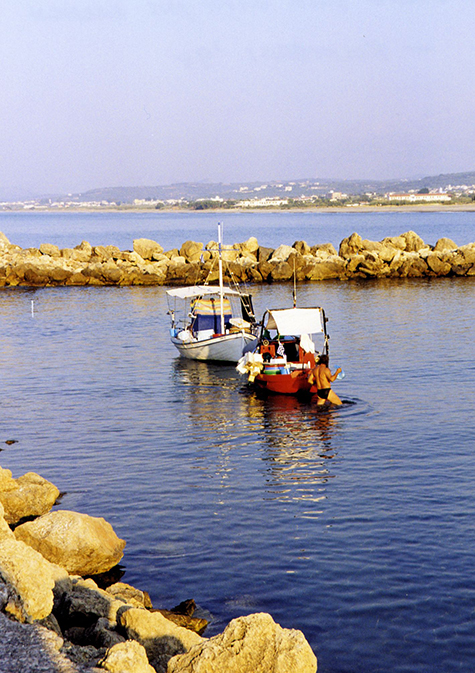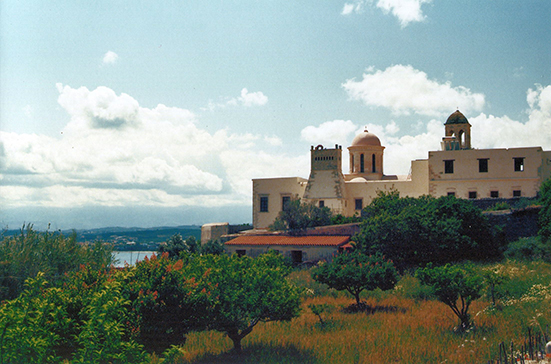British photographer Francis Drake has written a book — Arriving Unexpectedly: Meandering Through Crete — about his experiences on the Greek island during the 1980s and ’90s and has kindly allowed me to post this extract about a memorable conversation he had with a local fisherman in Kolimbari about the German invasion of his beautiful homeland.
Kostas smiled and went on in his heavily accented, but perfectly understandable English. “But you try to speak Greek that is good. Mostly it is the English who try to speak Greek.” He blew out a lungful of pungent tobacco smoke. “You know the history of you English in our land?”
“A little,” I replied. My father had been in the Royal Navy and although he wasn’t in the Battle of Crete, I had grown up hearing many stories of the sea, including those of HMS York and HMS Kelly together with something of the allied land forces.
Kostas snorted. “There was not a big sea battle. There was not even a big land battle; not like there was in North Africa and Italy but,” his voice was still for a moment. “But what there was bound us together forever. We Cretans and you English. People of two islands. He turned and shouted over his shoulder through the open doorway. A tiny little woman dressed in clothes so black that she seemed like a hole in space stepped out of what I had at first thought was a ruined house.
“Anna.” He spoke in Greek in his deep steady voice. I caught the words krasi, calamari and mezes. We were in for refreshments. The classic mistake is to confuse the words ‘Kala mera’ and ’Calamari’…
… So we ate and sat with the scents of harbour and land in our nostrils, the sun hot on exposed skin, and listened to a tale, which still echoes in my mind down the years.
Kostas took a drink and settled back. The air was clear and warm with the faint scent mix of smells so characteristic, herbs, sea, cooking and the ‘burnt’ smell of dust.
“They came,” Kostas began abruptly, “out of a clear sky and they could not be stopped in the air. You had no aeroplanes here. Your Generals did not listen to your Winston Churchill. The politicians,” he cleared his throat as if to spit on the floor, thought better of it and drank a little more wine. “The politicians got it wrong as always and our own soldiers were trapped on the mainland. Across there,” he pointed unerringly in spite of his blindness across the corner of the bay in the direction we had come from, “is where it all began. Maleme, the old airfield. Out of the sky in their thousands they fell, those German paratroopers. They descended like the seeds of the flowers, but they fell to sow death, not life; and like the dragons teeth of legend they grew up and no matter how many were killed, they kept on coming. You English and the Australians and New Zealand men fought like the devil and we, men, women and children stood alongside you. We had our father’s fathers’ guns, rifles, muskets, our scythes, our forks and spades. As they fell like the rain, so they died; for they never did understand the Cretan, or the English. The fact that no situation is without hope, where courage grows with each stroke and is present as an army where even one man is left standing!” Sightless eyes gazed at scenes we could not see. His voice thicker, Kostas went on. “For the life of the land is always present in him or her and the God loves them.” He drank deeply of the glass that Anna had topped up for him. I reflected on his story. Heavy as his English was, it couldn’t hide the soul of a Homer. In this old man lived a storyteller worthy of that ancient Greek tradition of oral history and the ‘Praise Singers’ who faithfully related it word-perfect at the fireside down the centuries. Kostas wiped his mouth on the back of his hand. “Do you know what happened then?” he asked.
“They occupied the island,” I replied quietly for we were not just getting a history lesson, no, we were in the presence of tragedy.
He cocked his head to one side looking for my meaning.
“Held it,” I added. His time-worn hand reached for mine and gripped it in a clasp of iron.
“Ochi,” he replied vehemently. “They murdered a people; future generations.” He snarled the words and his hands clenched until the knuckles showed white against his nut-brown hands. I thought my bones would crack. “But they paid a price. Many thousands of them lie beneath the earth of Crete and two thousand of your countrymen and from Australia and New Zealand lie beneath the grass at Souda. Thousands of our own people lie in graves as well… and some only the God knows where they rest. For four years they believed they held Crete, but they never held her, not in spirit, no matter how many they starved or murdered. For although it was war, what they did was murder. With our English friends in the mountains we fought on and even as they murdered our children, and our future, they were losing the battle. The God does not miss these things and they were losing. Four years it took! Four years, but they lost!” He said it with immense satisfaction. “You see my house and my neighbour’s? They were damaged then and we still struggle to win back our future. My sons died in those years as did many here. Have you seen the old empty houses in the hillsides? They are left as a memorial. The families they belonged to were murdered. Torn out of their houses, men, women and children. Lined up and shot. My neighbour had two sons, nine and eleven years. They went out to play after the curfew. A Nazi shot them both. Two little boys.”
The food was untouched as the story unfolded in a mixture of Greek and English. Kostas held us in thrall with the horror of that time. He had fought on these beaches and then in the mountains. His sight had failed a few years past but his memory was clear and his passion and that of his fellow islanders obvious. My throat was closed by the sense of pain and misery echoing down the years and from the corner of my eye I saw Jenny wipe away a tear. Ancient, silent Anna spoke not a word but placed her wrinkled hand lovingly on Kostas’s. They entwined with the ease and comfort of young lovers.
Kostas cleared his throat again. “I think that you are young and do not remember, but I think you understand, (my first memory is being snatched out of a warm cot, wrapped in a dressing gown and carried down into a stinking Anderson Shelter). The English will be forever our brothers because we bled together. Our blood stained our clothes, mingled on our hands and joined in the soil of the island. We have stood together and died together. Two island peoples. Two peoples who will never bow to might and what is wrong, but will always look to the horizon for freedom.”
I wished with all my heart that it might be so but thought of the stupid laws and regulations that were imposed on us daily to curb just such freedoms, curbing initiative and creativity by governments who grew more paranoid by the day and feared above all things a truly free people. They would so much rather every person became a cipher carefully documented and regulated every minute of life. One visit was now due. I would go to Souda and Maleme to the War Graves soon.
Francis Drake © 2014

